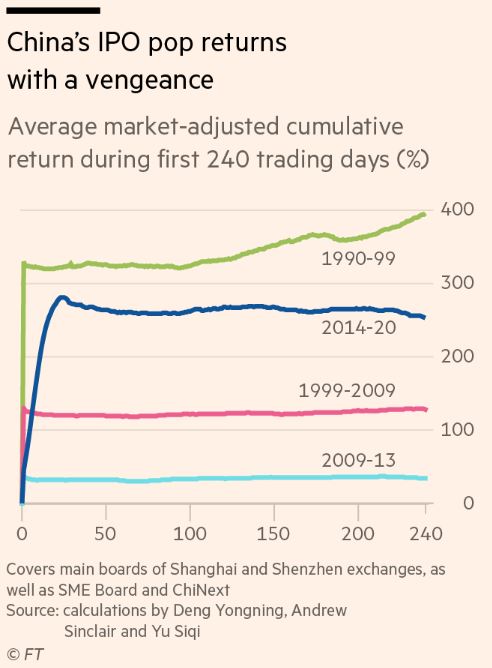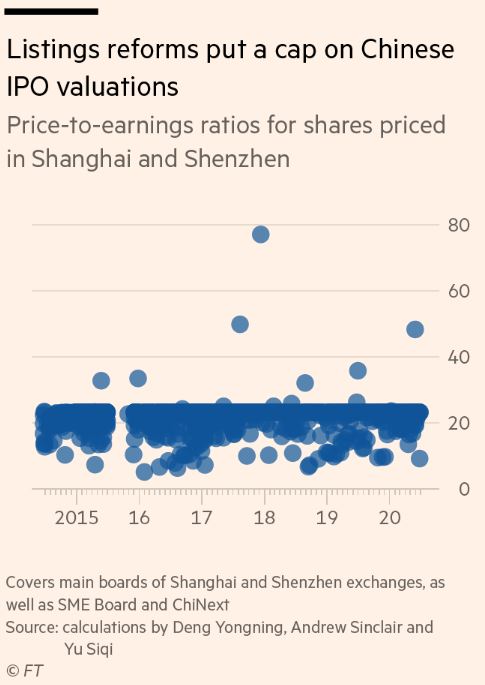SCOOP w/ @TomHale_: IPOs in China undervalued companies by about Rmb1.3tn ($200bn) over the last six years, per a new study HKU researchers shared with the FT. That’s a lot of cash that Chinese companies missed out on!  Let’s dive into the data
Let’s dive into the data 1/x https://on.ft.com/2MWBWA7
1/x https://on.ft.com/2MWBWA7
 Let’s dive into the data
Let’s dive into the data 1/x https://on.ft.com/2MWBWA7
1/x https://on.ft.com/2MWBWA7
Researchers analyzed about 1,300 IPOs from 2014-2020 on every Chinese stock exchange except Star (more on it later) and found the funds they raised were equal to only about a quarter of their actual value. 2/x
Why the last six years? Because that’s when regulators started capping valuations for onshore IPOs again to please investors, who were getting upset over how efficient listings had become. A quick history lesson… 3/x
See, retail traders and institutional investors buy a huge chunk of shares at their IPO pricing before a new stock hits the market. So when shares priced too low start trading they skyrocket, delivering a guaranteed windfall to investors. 4/x
ASIDE: the lottery scheme for retail investors supposedly spreads these gains out among mom & pop traders, but the HKU researchers found that wealthier individuals could easily game the system. See the full study here: https://papers.ssrn.com/sol3/papers.cfm?abstract_id=3779031 5/x
ANYWHO thanks to reforms, by 2009 the average day one IPO pop had fallen to 37%, compared to about 330% in the 1990s. Investors railed against such efficient pricing, forcing China’s securities regulator to walk back pro-market measures. 6/x
So new rules in 2014 and an implicit (but strictly enforced!) cap on valuations at 23x earnings per share (Alibaba’s NY IPO came in at around 40x, for ref). The China IPO pop returned in full force at about 300 per cent. 7/x
But what’s great for investors was bad for the companies. This is one major reason promising Chinese tech companies list offshore in HK and NY—so they don’t leave so much money on the table. BUT WHAT ABOUT STAR? 8/x
Indeed, what about the tech-focused Star Market, “China’s Nasdaq”, created with the direct backing of Xi Jinping with no cap on IP valuations? It’s not covered by the study—but the tell-tale pop persists. 9/x
See, bookrunners on Star IPOs have to buy shares in companies they bring to market and hold them for two years—ostensibly to keep them from listing garbo companies at inflated prices. But... 10/x
That incentivizes them to make sure the shares they’re required to buy pop enough to ensure they get a solid return when cashing out 24 months later—so underpricing continues. Star IPOs pop 160% on average since its launch, vs 19% on the actual Nasdaq during the same period. 11/x
There are other factors at play we don’t get into in the story, but I think it’s a fun read even if you’re not a capital markets/data/China finance dork like myself and (not to cast aspersions) @TomHale_: https://on.ft.com/2MWBWA7 12/x
And if you ARE a capital markets/data/China finance dork, be sure to check out the HKU study by Deng Yongning, Andrew Sinclair and Yu Siqi, by which has just been published online here!: https://papers.ssrn.com/sol3/papers.cfm?abstract_id=3779031 13/13

 Read on Twitter
Read on Twitter



